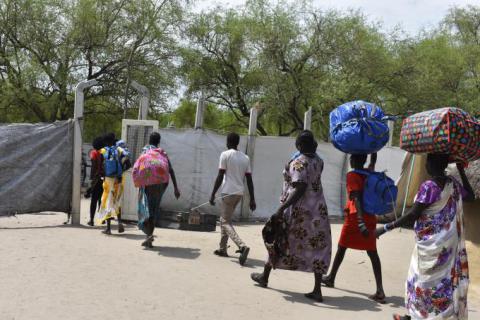Save the Children and partners return 58 abducted children and women to their families
Abductees in Pieri walking to board helicopter flight, back to their village of origin in Pibor on Thursday 31 March, 2021 where they were abducted. Photo: Tito Justin/Save the Children
6 April, Juba: 58 children and women previously abducted from their families during inter-communal violence were returned to their families, as part of a Save the Children-led partnership with UNMISS and other agencies.
The children and women were abducted from across the country, including Akobo, Walgak, Pierri, Lankien, Pibor and Maiwut. The children range in age from two to eighteen with some separated from their families for more than five years.
The return and reunification process is the result of a goodwill agreement facilitated by UNMISS with support of community leaders, the Government of South Sudan, Peacebuilding Opportunities Fund, as well as other organizations and agencies.
Save the Children with its local partners were active participants in the peace conversations, as well as leading the family tracing and reunification of women and children. The family tracing and reunification process is being supported by a grant of more than USD $1.5 million to the Office of the High Commissioner for Human Rights (OHCHR), the United Nations High Commissioner for Refugees (UNHCR), and Save the Children, through the Reconciliation, Stabilization and Resilience Trust Fund.
Boyoi*, 16, was abducted from Pibor in May 2020 when she was just 15.When her village was attacked by armed youths, her family scattered in different directions. Boyoi, her mother, sisters and brother were all abducted and taken to different locations after the attack. From Pibor, Boyoi found herself in Pieri, a four-day-walk away. Eventually, Boyoi and her mother were identified among other abductees in Pieri and kept under protection by Community Aid Organization, a partner of Save the Children. Boyoi is now back with her family in her home village.
Boyoi said:
“When we were attacked in May 2020, we ran in different directions. My mother, brother and sisters were taken by the attackers into different directions. I didn’t know that they were also abducted like me. For me I was also taken alone by the abductors. That was a long journey. It took us four days walking to reach to the abductors town. I didn’t know the whereabouts of my parents including my brother and sisters. One day, I came to the market with the daughter of the man who abducted me. In the market, I met my mother and I decided to follow her to where she is living. For me, if the government or NGOs say they want to take me back to my father, I am willing to go”.
Rama Hansraj, Save the Children’s Country Director in South Sudan, said:
“Family tracing and reunification goes to the very heart of what we do at Save the Children. It’s the process of bringing children back to the people who love them, who miss them, and who are best placed to give them the care and security they need to live and grow and survive.
“Children who have been abducted from their families during conflict must be protected, treated as victims and supported to recover and reintegrate with their communities. The experience of being associated with an armed force or group can have an immediate and lasting impact and consequences for boys and girls. This includes death, sexual violence, exploitation and abuse, physical injury or disability and the long-term impact of chronic health conditions, including sexually transmitted infections.
“Save the Children is proud to work alongside our partners and UNMISS to perform this critical work. We look forward to continuing to working with our partners and governments to rebuild the lives of these families and bring greater peace and hope to South Sudan.”.
In South Sudan, Save the Children is the leading agency in family tracing and reunification and, with our partners, we are really proud that so far we have been able to reunify around 7000 children that were separated from families because of the conflict.
About Family Tracing and Reunification (FTR)
Save the Children and partners work to prevent family separation amid chaos and conflict by informing people how to set up ad-hoc community systems keeping families together. When separation occur, cases of missing children and parents are registered in a national database for family tracing which is done by a number of caseworkers across South Sudan. When there is a match, a verification exercise starts to ensure the parents and children are related. After, the actual reunification is initiated. The family also receives support in a transitional period, including food and other basic needs such as clothes. The family is also followed up by the caseworker for three months after the reunification to ensure reintegration is successful.
About Save the Children
Save the Children has been working with and for children, their families and communities in South Sudan since 1991. We provide children with access to education, healthcare and nutrition support, and families with food security and livelihoods assistance. Our child protection programs support vulnerable children including unaccompanied and separated children and those affected by violence, as well as advocating for children’s rights at national, state and community levels. We save children’s lives. We fight for their rights and we help them fulfil their potential.
*Names changed to protect identities
For any other inquiries, please contact:
Kangu Tito Justin, Media and Communication Coordinator Save the Children Tito.Justin@savethechildren.org | +211922844458
 South Sudan
South Sudan 